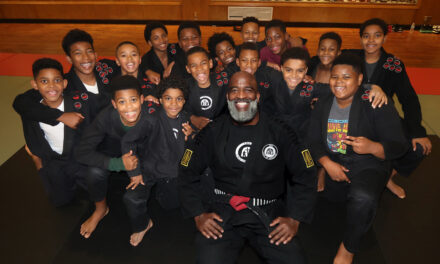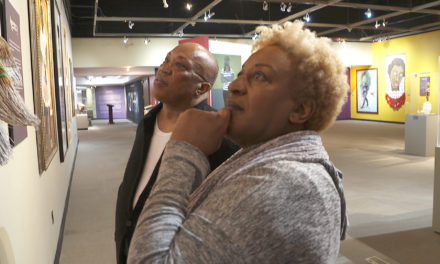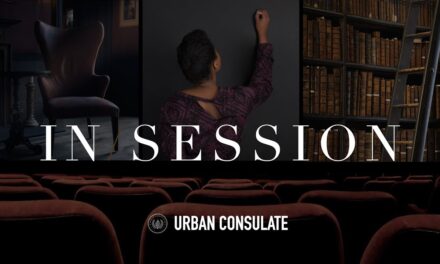He’s been called one of the most powerful voices of our generation by the Los Angeles Times, and he won the 2020 Sphinx Competition Medal of Excellence, which recognizes extraordinary classical musicians of color. Now, classically-trained bass-baritone opera singer Davóne Tines has landed in Detroit as the 2021-2022 artist-in-residence at Detroit Opera, where he’ll portray Malcolm X in the upcoming production of “X: The Life and Times of Malcolm X.”
Host Stephen Henderson sits down with Tines to talk about his residency and his role in portraying Malcolm X in composer Anthony Davis’ “X: The Life and Times of Malcolm X” for the May 14-22, 2022 show. Plus, Tines shares how he got involved in singing and music at an early age, and the barriers he’s had to face as an African American man coming up in a predominately white space.
Full Transcript:
Stephen Henderson, Host, American Black Journal: Set to Opera. Right there, that’s a provocative statement. And tell us what that’s been like pulling this all together.
Davóne Tines, Artist-In-Residence, Detroit Opera: Completely. So the incredible Anthony Davis, Pulitzer Prize-winning composer and actually his cousin and common collaborator, Thulani Davis. I think that they have made a really unique mark in opera in telling black stories. Anthony Davis won the Pulitzer for his opera, a Central Park Five. And just tackling a number of critical stories in that form.
Davóne Tines: And as I was saying, I think what that form brings is attention and scale. So a character like Malcolm X deserves that attention and that scale. And I think the way that they’ve worked out how this piece exists does that in an incredible and special way. Anthony writes in a jazz idiom, essentially, but co-mingled with classical.
Which some people would say, are you know, different branches of the same tree. But I think it’s going to be really incredible for audiences to experience. What does it mean when you take a full symphonic orchestra with a jazz quartet or a jazz ensemble embedded in the middle, and have that kind of expression blasted to that scale, all with the purpose of saying, you know, this man’s life and furthermore, his mission are even beyond the scale of the resources we have available.
Stephen Henderson: Yeah. And for you personally, playing this role, talk about how that feels.
Davóne Tines: Completely. I continue to find that being a performing artist is a deep blessing and a privilege. In order to live out onstage emotions and ways of being that don’t necessarily exist or that I wouldn’t have the opportunity or venue to express otherwise. And being a black man in America, being a black person or marginalized identity in this country, as James Baldwin says, could fill someone with a sort of badness.
Davóne Tines: And taking on this role, you know, it allows a place to put all of that energy. Not to say that Malcolm X is mad, but I think he’s often misconstrued as a person who had ill intent or malice. And one thing I continue to deeply respect in looking into his life and his work was that I think he really just aimed to be a mirror. He aimed to be a reflecting point of the world and of the time that he lived in.
You know, the first aria in the opera titled You Want the Truth but You Don’t Want To Know. Talks about how his family and he had been through so much degradation at the hands of white people. His father being killed, his mother not being able to collect insurance on that hate crime of a death and later being, you know, driven to her own madness and his family being just assembled by a white system that didn’t have space for their particular, quote-unquote, problems.
All of what he did was motivated as a reaction, as a reflection of the energy put towards him. So he said, ‘if my life had been torn asunder at these forces, why shouldn’t I have access to those same forces in order to save or continue my life? But even more altruistically, the lives of my people.’
Stephen Henderson: You know, the relationship between Detroiters and the arts has always been really strong. And of course, we’ve produced lots of great art in many different forms here in Detroit. I’m not sure everybody thinks of classical music or they think about that. I imagine you’d like to change that.
Davóne Tines: Completely. Something I’ve been really, really interested in for a long time is trying to figure out what is opera really, or what is the greater potential of opera. And I think part of that has to deal with going back to a deeper root of what opera was. And it has to do with, you know, the word opera in Italian means work.
And a part of that definition has to do with how can you bring together different mediums, different esthetics, whether that’s in orchestra or lighting or the grandiosity of a theater to work to focus on telling a story. So opera is an essence, a really incredible way to tell a story. And often the stories that people know from opera are not something that people can really connect to.
Davóne Tines: You know, maybe it’s in German. Maybe it’s telling the story of people that one doesn’t see themselves in. So I’m trying to make it a priority for people to understand that opera is anything with intentional storytelling.
And I think especially with this piece X, it’s an opportunity to put a story that isn’t normally engaged, a story that I think many people today, especially black people, can connect to and saying this is opera, too. This deserves those resources. This deserves that sort of consideration. And so I think a way to save or redefine opera is to change what stories and what people are in the middle of it.
Stephen Henderson: In addition, of course, there are not as many African-Americans who work in the classical music space or in the operatic space as we like. But tell us how you became interested in this and decided that this is how you wanted to spend your life and express your art?
Davóne Tines: Definitely. Well, I grew up in Northern Virginia and singing in the Baptist church there. My grandfather was a church choir director, but also in the Navy for a long time, and he discovered that I had a unique voice. One day he sang kind of jokingly, How are you? And I said, ‘I am fine.’ And he thought, ‘Whoa, you have something else going on there?’
And I didn’t think that I wanted to sing or had anything to do with it, you know, in a professional way. But he really encouraged me to figure out, you know, what is classical singer, what is a way of training my voice in order to communicate something. And then I also played violin for about 14 years and also sang in a lot of the different church contexts, be it the Baptist Church or the Greek Orthodox Church or even the Catholic shrine in Washington, D.C..
And what I respond to, I think, most in music making is when it’s done for a reason. And in the church, music is always made for a reason. It’s in order to connect to our human and lived experience. So walking into an operatic context or the classical music world, I never fully saw it for what those stories were or what the content was. I saw it for its possibility. I saw what is it? If we can take an orchestra and put it with gospel as people like Kirk Franklin have so brilliantly done.
Or what is it if we take, you know, the grandiosity of the theater and pay homage to stories that we just don’t lift up as a society. So I’ve always been trying to engage it for the tools, and I think that also has to do with a larger tradition of black people in America taking what’s available to us in order to get along and do what we need to do and what we need to do right now, I think, is tell stories that are going to change perspective on how we exist.
Stay Connected:
Subscribe to One Detroit’s YouTube Channel & Don’t miss One Detroit Mondays and Thursdays at 7:30 p.m. on Detroit Public TV, WTVS-Channel 56.
Catch the daily conversations on our website, Facebook, Twitter @DPTVOneDetroit, and Instagram @One.Detroit
View Past Episodes >
Watch One Detroit every Monday and Thursday at 7:30 p.m. ET on Detroit Public TV on Detroit Public TV, WTVS-Channel 56.




